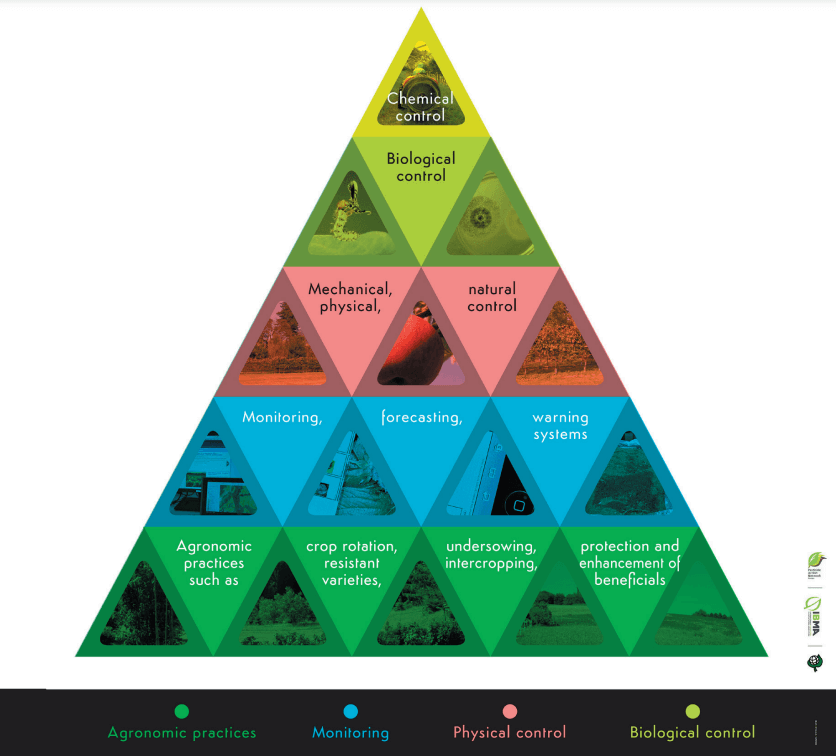Alternatives to glyphosate
There is a common misconception that herbicides, particularly glyphosate-based herbicides (GBH), are safe for human health and have minimal impact on the environment. This misbelief has led to their widespread use in mainstream agricultural systems. As a result, tonnes of GBH and other herbicides are applied every day to fields and their surroundings, which can put human health at risk and negatively impact biological processes and ecosystem functioning. Several scientific studies have indicated the potential risks of glyphosate to various species, such as birds, reptiles and beneficial arthropods, including pollinators (Ruuskanen et al., 2020; Graffigna et al., 2021).
Thankfully, much safer non-chemical alternatives do exist for all major uses of GBH, despite agroindustry claims that there are no viable alternatives to GBH for weed management. The transition to glyphosate-free agriculture is entirely feasible and economically viable. Organic farmers have successfully employed non-chemical methods for over 70 years. While significant scientific progress in non-chemical weed management techniques has been achieved. The prohibition of synthetic herbicides in organic agriculture since the 1960s has also facilitated the development of a wide range of specialised weeding machinery.
The use of herbicides, including glyphosate, can be significantly reduced, even eliminated in conventional agriculture. Numerous non-chemical weed management methods are already available.
These alternatives include crop rotation, intercropping, weed management by livestock, mulching, robotic weeders, electrothermal weeders…
Significant reductions in pesticide use are possible using Integrated Weed Management (IWM), a comprehensive approach to managing weed populations that involves combining various weed control methods and strategies in a coordinated and strategic manner. IWM promotes sustainable weed management practices and spares the use of pesticides for when they are truly necessary. It requires ongoing monitoring of weed populations to determine the most effective control strategies for a given situation and involves methods such as cultural practices (crop rotation, intercropping, and cover cropping), mechanical control (physical removal of weeds using hand pulling, hoeing, or cultivation), or biological control (use of natural enemies to control weed populations).
Many non-chemical methods are available to avoid the use of glyphosate. These alternatives offer both low and high-tech options that offer different advantages to farmers. However, it is vital to integrate various methods into non-chemical weed management because one method is rarely enough to manage all weeds at all times in all crops. Indeed, even with herbicide-based weed management, a range of different types of herbicide modes of action are required to achieve sufficient weed management across the whole farm.
According to Dr Charles Merfield, a world-leading expert in non-chemical weed management, there are numerous benefits of transitioning to non-chemical weed management in farming practices. These benefits include improving soil health, preserving biodiversity, reducing the presence of novel entities such as agrochemicals in the environment, and promoting cleaner water and air. Rather than being a risk, Dr Merfield considers that this shift towards IWM focused on non-chemical techniques presents a significant opportunity to enhance all aspects of farm systems, including profitability. It requires changes to the wider farm system, principally diversification, such as a wider range of crops and livestock, in a rotation.
A wealth of information can be found in the report titled: “WEED MANAGEMENT: ALTERNATIVES TO THE USE OF GLYPHOSATE”. This report serves as a valuable and relevant resource for anyone interested in alternatives to glyphosate. It provides comprehensive information on the Integrated Pest Management (IPM) approach and the diverse range of weed management approaches available to achieve effective weed control without the use of herbicides.

Resources
Factsheet :
Pan Europe report 2023 (Report in Italian)
Articles / vidéo :
Ecologistas en acción (2021): El glifosato contamina las aguas superficiales y subterráneas
Global 2000 (GER) (2021): ALTERNATIVEN ZU GLYPHOSAT
Générations Futures (?) : Alternatives aux pesticides
Instytut Spraw Obywatelskich (2O22) : Glyphosate en agriculture - alternatives
Reporterre (2017) : Se passer du glyphosate ? C’est possible
La Croix (2017) : interview François Veillerette : « Il existe déjà des alternatives », Générations Futures
Video PAN Germany (2017) : A herbicide-free future. Considering solutions across Europe.
Video Greens EFA/ Pan EUROPE (2019) : A herbicide-free future. Considering solutions across Europe.
Scientific research papers
Ruuskanen, S. et al., “Glyphosate-based herbicides influence antioxidants, reproductive hormones and gut microbiome but not reproduction: A long-term experiment in an avian model”, (Environmental Pollution, 266, 2020).
Graffigna, S. et al., “Glyphosate commercial formulation negatively affects the reproductive success of solitary wild bees in a Pampean agroecosystem”, (Apidologie 52, 272–281 (2021)).
